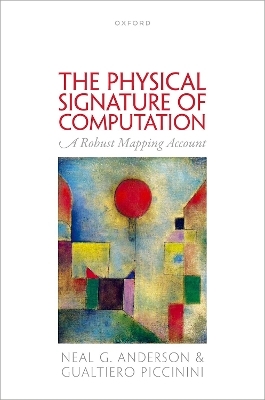
The Physical Signature of Computation
Oxford University Press (Verlag)
978-0-19-883364-2 (ISBN)
In The Physical Signature of Computation, Neal Anderson and Gualtiero Piccinini articulate and defend the robust mapping account--the most systematic, rigorous, and comprehensive account of computational implementation to date. Drawing in part from recent results in physical information theory, they argue that mapping accounts of implementation can be made adequate by incorporating appropriate physical constraints. According to the robust mapping account, the key constraint on mappings from physical to computational states--the key for establishing that a computation is physically implemented--is physical-computational equivalence: evolving physical states bear neither more nor less information about the evolving computation than do the computational states they map onto. When this highly nontrivial constraint is satisfied, among others that are spelled out as part of the account, a physical system can be said to implement a computation in a robust sense, which means that the system bears the physical signature of the computation. Anderson and Piccinini apply their robust mapping account to important questions in physical foundations of computation and cognitive science, including the alleged indeterminacy of computation, pancomputationalism, and the computational theory of mind. They show that physical computation is determinate, nontrivial versions of pancomputationalism fail, and cognition involves computation only insofar as neurocognitive systems bear the physical signature of specific computations. They also argue that both consciousness and physics outstrip computation.
Neal G. Anderson is Professor of Electrical and Computer Engineering at the University of Massachusetts Amherst, where his research and teaching has emphasized various aspects of physical electronics. His current research focuses are the physical dimensions of information and computation, their physical-information-theoretic description, and their implications for our fundamental understanding of information processing and for future information technologies. Gualtiero Piccinini is Curators' Distinguished Professor of Philosophy and Associate Director of the Center for Neurodynamics at the University of Missouri--St. Louis. In 2014, he received the Herbert A. Simon Award from the International Association for Computing and Philosophy. In 2018, he received the K. Jon Barwise Prize from the American Philosophical Association. In 2019, he received the Chancellor's Award for Research and Creativity from University of Missouri - St. Louis. His publications include Physical Computation: A Mechanistic Account (OUP 2015), Neurocognitive Mechanisms: Explaining Biological Cognition (OUP 2020), and The Computational Theory of Mind (with Matteo Colombo, 2023).
Introduction
1: Physical Computation: A Philosophical Primer
2: Physical and Computational Description
3: Computational Description of Physical Systems
4: Descriptive Strength and the Adequacy of Implementation Claims
5: The Robust Mapping Account of Implementation
6: Unlimited Pancomputationalism
7: Limited Pancomputationalism
8: Ontic Pancomputationalism
9: Computation and the Mind
10: Conclusion: The Physical Signature of Computation
Appendix A: Satisfaction of Criterion PCE
Appendix B: Selected Results from Physical Information Theory
| Erscheinungsdatum | 22.08.2024 |
|---|---|
| Zusatzinfo | 14 line drawings |
| Verlagsort | Oxford |
| Sprache | englisch |
| Maße | 160 x 240 mm |
| Gewicht | 686 g |
| Themenwelt | Geisteswissenschaften ► Philosophie |
| Mathematik / Informatik ► Informatik ► Theorie / Studium | |
| Naturwissenschaften | |
| ISBN-10 | 0-19-883364-4 / 0198833644 |
| ISBN-13 | 978-0-19-883364-2 / 9780198833642 |
| Zustand | Neuware |
| Haben Sie eine Frage zum Produkt? |
aus dem Bereich


